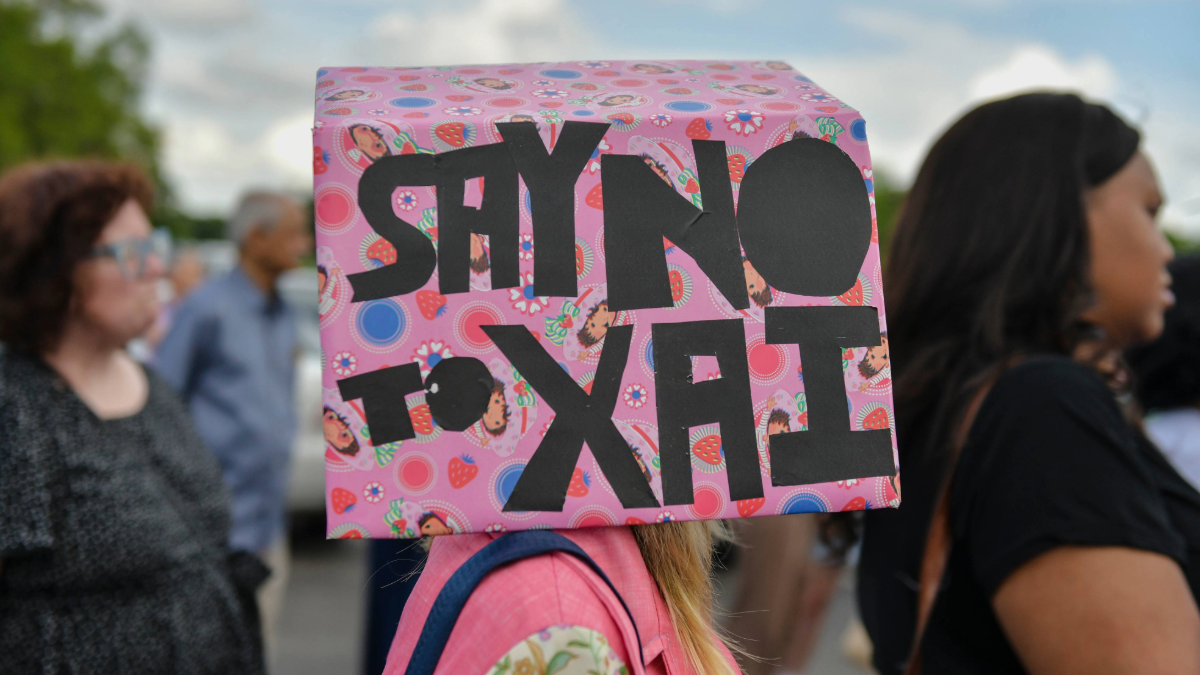Progress Shouldn’t Poison Black Communities
Nasser Eledroos / Jun 25, 2025
MEMPHIS, TN - APRIL 25, 2025: Demonstrators gather outside of Fairley High School in opposition to xAI's use of gas turbines for its data center ahead of a public comment meeting on the project. (Photo by Brandon Dill for The Washington Post via Getty Images)
In South Memphis, Tennessee, a neighborhood called Boxtown is paying the price for the AI revolution with every breath. This historically Black community, founded by formerly enslaved people who built homes from discarded railroad boxcars, now faces a new threat: massive gas-powered generators installed by xAI — Elon Musk’s artificial intelligence company — that are poisoning their air.
These generators power the “Colossus” supercomputer that trains Grok, Musk's competitor to ChatGPT. Environmental groups using thermal imaging discovered 33 gas turbines operating on site, emitting an estimated 1,200 to 2,000 tons of nitrogen oxides annually — compounds that cause respiratory problems and contribute to smog formation. This makes xAI one of the county's most significant pollution sources virtually overnight, in a neighborhood where cancer rates are already four times the national average due to industrial contamination. At a recent public hearing, Boxtown resident Alexis Humphreys held up her asthma inhaler and asked through tears: “How come I can't breathe at home and y'all get to breathe at home?”
Now the Trump administration is making things worse. In March, Environmental Protection Agency (EPA) Administrator Lee Zeldin announced plans to gut the very regulations that could protect Boxtown, eliminating climate rules and slashing the EPA's enforcement staff. His promise to 'drive a dagger through the heart of climate change religion' means companies like xAI will face even fewer barriers to poisoning Black neighborhoods. Trump also rescinded the Justice40 Initiative — a historic program requiring 40% of federal climate investments to benefit disadvantaged communities.
This deregulation push isn't accidental: it's what Big Tech paid for. Tech giants spent a record $61.5 million on lobbying in 2024, up from $68 million in 2023, with Meta spending $24 million and OpenAI increasing its spending nearly seven-fold to $1.76 million. These companies explicitly lobbied for “cheaper energy, lucrative national security contracts, and a more lax regulatory environment.”
Environmental racism goes digital
What's happening in Memphis reveals how AI is creating a new form of environmental racism. Unlike previous tech booms that exported their dirtiest work overseas, AI's massive infrastructure must stay close to home — and it's landing squarely in Black and brown neighborhoods.
AI systems have unique physical constraints that force them to remain within US borders. A single AI supercomputer draws enough power for 15,000 homes and requires continuous cooling and minimal transmission delays. This is why xAI was built in Memphis rather than Mumbai. The machines powering ChatGPT or Grok can't be hidden in distant countries; they need reliable power grids and fast internet connections to serve American consumers. But instead of distributing this infrastructure responsibly, Big Tech targets communities with the least power to resist.
The pattern is evident across the country. In Georgia, working-class residents have faced six utility rate increases since 2023 as power companies expand to meet the demands of data centers. The state now hosts more than 50 data centers, each mid-sized facility consuming enough electricity to power thousands of homes while using approximately 300,000 gallons of water daily.
In Arizona, Google secured rights to 4 million gallons of water daily in Mesa — about what 23,000 residents use — in a state facing drought. Microsoft's facility in Goodyear keeps its water usage secret, claiming the figures are “proprietary information.” Meanwhile, Arizona officials have revoked construction permits for new homes due to insufficient groundwater.
Fighting back
But Boxtown isn't surrendering. Memphis Community Against Pollution (MCAP), led by KeShaun Pearson, is building on the neighborhood's history of resistance — the same community that defeated the Byhalia crude oil pipeline in 2021. Working alongside Black Voters Matter and environmental justice groups like Young, Gifted & Green, residents are demanding transparency from both xAI and city officials.
The Southern Environmental Law Center partnered with SouthWings to conduct aerial surveillance, using thermal imaging to reveal that 33 of xAI's 35 gas turbines were actively running, contradicting the company's claims. Hundreds of residents packed public hearings opposing xAI's air permit, with nearly every comment opposing the project.
This isn't the first time Black communities have borne the environmental costs of “progress.” From “Cancer Alley” in Louisiana to Chicago's South Side, polluting industries found homes where political resistance was weakest. The digital revolution initially seemed different, outsourcing its dirty work to Foxconn factories in China or e-waste dumps in Agbogbloshie, Ghana. But AI's physical requirements mean the pollution can't be exported entirely — so it's being internalized in the most vulnerable American communities instead.
With the EPA planning to eliminate its endangerment finding and cut staff to 1980s levels, state and local action becomes our last line of defense. The Clean Air Act, which has prevented more than 400,000 premature deaths and achieved a 50% decline in key air pollutants since 1990, gives states authority to regulate power plants serving tech companies, set pollution limits, and enforce penalties.
- First, state utility boards should create special pricing rules preventing everyday people from subsidizing Big Tech's energy use. Ohio's utility already proposed making tech companies pay 85% of expected energy costs upfront.
- Second, local governments can give communities real voice through zoning and permit requirements. Cities can demand neighborhood impact studies, public meetings, and changes based on community feedback. Virginia regulators have shown this works by requiring utilities to prove they can meet climate goals despite data centers' massive demands.
- Third, Congress should pass the Clean Cloud Act to create clear emissions standards for AI infrastructure.
- Fourth, we must rebuild Justice40 protections through state and local action, ensuring that economic development benefits historically disinvested neighborhoods rather than harming them further.
AI represents the most significant technological change since the Industrial Revolution. When people in South Memphis can't breathe clean air because of AI data centers operating nearby, that's not just a local problem — it shows how a technology promising to help is actually hurting us. Organizations like Color Of Change are fighting back with frameworks such as the Black Tech Agenda for navigating how technology should lift Black communities up, not push them down.
AI is already poisoning Black communities — the generators chugging in Boxtown are just the beginning. The damage is real, it’s now, and it’s growing. We still have a chance to stop it, but only if we act before it’s too late.
Authors
